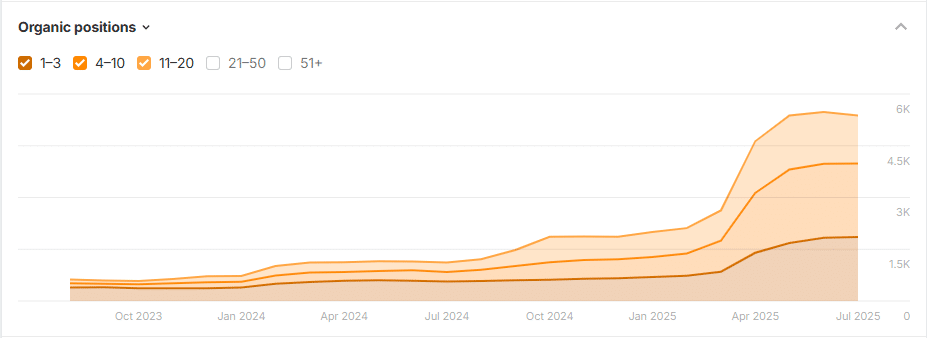B2B Content Audit Services
How many leads have your blog posts generated this past year? How about demos booked from your solutions landing pages? If you aren’t sure of these numbers, have no idea how well your existing content is performing, or are flat out disappointed of not getting results with that content, you might need a content audit.
B2B Content Audit Services
How many leads have your blog posts generated this past year? How about demos booked from your solutions landing pages? If you aren’t sure of these numbers, have no idea how well your existing content is performing, or are flat out disappointed of not getting results with that content, you might need a content audit.
Some of The Amazing Brands
We’ve Worked With



Real Impact From Our Content Partnerships

“The team’s efforts and diligence around our SEO strategy from every angle has yielded truly incredible results thus far.”
– Lindsay Revill
Head of Marketing @ Expensify
50%
Increase in product signups in 6 months
260%
Increase over the monthly organic traffic goal
175%
Increase in target keywords ranking in positions 1–3



Content Audits With Clear Plans And Powerful Outcomes
Focus On Factors That Match Your Business Objectives
When you evaluate your content, and when we begin our evaluation, the key is to focus on how your content assets will help your business. Many B2B companies look at resources, blogs, and landing pages as an annoying “nice to have, but not necessary” component of their marketing. The reason for this is because their content was likely created as an afterthought with no strategy.
Great content that is laser targeted to solve your target prospect’s needs and helps move them into a purchase decision with you is anything but trivial. It’s absolutely crucial to today’s B2B buyer landscape. That’s why we work with you to identify what metrics should be tracked to identify content performance and which metrics should be evaluated during the audit.


Manual and Meticulous Analysis
There are some things in the world of digital marketing that are best left for tools and software to solve, and some need a human brain. This is a situation for a mix of both. In order to gather intelligence on how your content is performing we use a variety of different tools to understand how your content assets are performing.
However, at the end of the day, there is no tool on the market that can tell you how well a piece of content answers the intent of a CMO at your list of top 10 prospective companies. Only through working closely with you and your firm can we identify core objectives, and scrutinize each content asset through that lense. Our analysis process is manual because we know what to look out for above and beyond what a tool (however clever and helpful) can tell you. It’s that 5-10% different in specific quality and relevance that separates good content from great.
Recommendations & Implementation
So what happens after we identify the gaps and the analysis is complete? Well, we do what all agencies worth their salt do, we get to work on fixing what’s broken. Methodically, and in order of importance. It’s one thing to “consult” on recommendations, pass along some information to you, and then go on our merry way. Anyone can do that.
It’s another thing to do the research, analyze the facts, make recommendations, implement the changes, and then analyze your own work for effectiveness over time. That’s what elite content marketing agencies do, and it’s the only way we know how to deliver.

Take Control Of Your SEO-Sourced Pipeline
Content Audits Are Part Of A Larger Strategy
Every successful content strategy and SEO campaign is built off of strong research and planning. Our strategists start by taking the time to deeply understand your target customer and conduct the right research to uncover your most profitable opportunities.
Our system includes intent based keyword research, competitor analysis, content audits, technical SEO audits, and more in order to gather the right data.
We take these and work with you to prioritize the best fit strategy for your product.
After we’ve set our strategic north star, it’s time to get to work on your SEO foundations. In this stage we’re filling all of the gaps that we found in our analysis.
We’ll be updating title tags, improving website load performance, optimizing website url structure, creating bottom of funnel keyword targeting solutions pages, and fixing any code level technical errors.
This is all about improving your website to find the perfect balance between your business goals, your target customer’s needs, and what Google wants to see in order to rank you well.
Once we’ve built out your foundations and optimized the existing website content, we’ll shift to scaling your website’s performance.
This involves high quality content production, building links and creating partnerships to boost your domain authority, strategy consultation, and regular updates to ensure that you’re always one step ahead of the competition.
At this stage you’ll notice more inbound organic sourced website visitors and leads than ever before.
Now that we’ve seen significant improvements in inbound new website visitors and organic sourced leads, it’s time to refine.
We’ll work with you to identify how well these MQLs convert into SQLS, talk through your new sales cycle, and ensure that we’re not just generating “leads”, but that only the most qualified and ready to close opportunities are coming to your doorstep.
At this point, we’ve built your inbound flywheel to new heights. High quality and high value leads have been flowing directly from our SEO and Content efforts. Now is the time to analyze your pipeline value and deals closed to look at your return on investment.
We’ll work with you to dive into your CRM to ensure that the business value has exceeded the costs of our services and most importantly, further refine our strategy to take advantage of your most pressing business opportunities for the upcoming year.
FAQs
A content audit is a systematic process that involves gathering a set of content pieces you want to understand and improve. It includes analyzing their performance and deciding on the best ways to enhance them.
Every content audit includes an inventory of each page on your website within the agreed to scope, paired with the following metrics:
- Page authority
- Website visitors
- Total ranking keywords
- Average time spent on page
- Backlinks
- Internal links
- Title tag
- Meta description
- H1
- H2s
- Url
After we collect these metrics, our SEO strategists will analyze the content performance and give each piece of content a recommended action as a next step.
The most important action you can take before starting a content audit is to understand your goals and target outcomes as a result of the content audit. Do you want to focuses only on improving underperforming content? Do you want to prune broken or non ranking pages? Or are you hoping to improve content user experience or engagment versus performance on Google?
